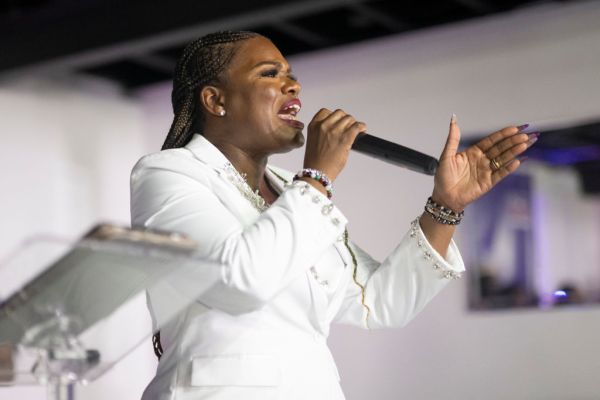One might think a party convention would supply endless inspiration for a political columnist, but not so. It all depends.
The Republican National Convention made for good copy because the GOP is a party in ideological flux, which is inherently interesting. When Donald Trump named J.D. Vance as his running mate, he made a decisive break from conservatism and turned toward nationalism as the future of the right. There’s a lot to say about that. None of it is good, but still—a lot to say.
Trump reliably makes for good copy too as he struggles to impose order on his disordered mind. His convention speech was noteworthy for just that reason: He started strong, working off a tight script that aimed to convince America the attempt on his life had left him a changed man … before wandering off into his own stream of consciousness for an hour, proving that it hadn’t.
Conflict, within the party or within its leader’s own tortured psychology, makes for interesting political coverage. There’s been practically zero conflict at the Democratic National Convention over its first two days.
So what is there to say about it? “Great speech, Michelle”?
The prospect of mass protests outside the convention à la 1968 promised real conflict, possibly of the hand-to-hand variety involving Chicago P.D., but even that’s up in smoke. The Atlantic’s correspondent estimated there were no more than 5,000 demonstrators on Monday and possibly as few as 2,000. Organizers were expecting 50,000. Attendees were thoroughly fringe too, with author Michael Powell claiming to have encountered socialists, communists, Trotskyites, North Korean sympathizers(!), and two men carrying the flag of Kurdish anarchists for some reason. Piles of signs created for protesters to carry went untouched when a larger crowd failed to show.
Outside the convention, you’d be forgiven for thinking the far left is a spent force politically. Inside the convention, you’d be forgiven for thinking the same.
Not only have there been few hardline progressive speakers (Bernie Sanders got camera time but not a raucous reception), one of the more interesting bits of news to come out of Chicago was Rep. Alexandria Ocasio-Cortez meeting with the father of Israeli American hostage Itay Chen on the sidelines. The two even posed together for a photo while holding a poster with Chen’s picture, which felt more significant—even transgressive—than it should have.
It shouldn’t be remarkable that a member of Congress would express sympathy for an American held by Hamas, but Ocasio-Cortez is the most prominent member of the “Squad,” the faction of young, nonwhite far-left Democrats who have entered Congress since 2018. They’re the bleeding edge of progressivism and the beating heart of the “free Palestine” movement in the House. Watching AOC, of all people, associate herself with the Israeli effort to recover its hostages was so striking that one observer treated it as a de facto ideological surrender.
“We are seeing the end of the Squad in real time,” he wrote. “[Jamaal] Bowman is gone, [Cori] Bush is gone, and AOC has come over to our side. An absolute victory. The Dems have cleaned house. We eagerly wait for the GOP to do the same.”
Is that true?
The taming of the Squad.
It’s certainly true that the Squad ain’t what it used to be.
That’s not just a matter of Bowman and Bush getting ousted in primaries this year either. When Ocasio-Cortez addressed the Democratic convention on Monday, her message was wildly different in emphasis than it was four years ago.
In 2020, Yair Rosenberg notes, she sounded like a woke grad student vowing to “recognize and repair the wounds of racial injustice, colonization, misogyny, and homophobia, and to propose and build reimagined systems of immigration and foreign policy that turn away from the violence and xenophobia of our past.” On Monday, he went on to say, she sounded like the bartender she used to be when she slammed Trump as a “two-bit union buster” and touted Kamala Harris as a champion of the American worker by comparison.
The Squad, I suspect, has learned—the hard way—that cultural leftism will not a majority make. If they’re going to gain power in the party, leftist economic populism is a better bet.
One way they learned that was after the 2020 election, when some of their fellow Democrats blamed “defund the police” agitprop for the party’s poor performance in House races. They learned it again this year when Bowman and Bush made enemies of pro-Israel liberals and were bounced by center-left primary challengers.
It must be equal parts dispiriting and terrifying for Ocasio-Cortez and her progressive colleagues to read reports of working-class nonwhite voters drifting toward Trump. That cohort should be the bread and butter of a racially diverse populist faction like the Squad. If they’re losing some of those voters to a right-wing authoritarian, their approach urgently needs adjusting. So AOC has adjusted.
I suspect she and her allies have also adjusted their expectations of how much, and how quickly, the ranks of young progressive populists might grow in Congress after a wave of figures like her, Ilhan Omar, and Rashida Tlaib first won House seats. Young radicals always believe they’re on the cusp of displacing a stodgy establishment, but after watching Bowman and Bush lose and Bernie Sanders twice be defeated in national primaries by lackluster establishmentarians, the Squad has had to face the fact that they simply won’t have the numbers to take over their party anytime soon.
Their revolution has failed, so they’re doing what failed revolutionaries usually do to maximize their influence. They’re working within the system to try to gain political influence that way.
It’s weird, but not coincidental, that some of Joe Biden’s staunchest supporters after his disastrous debate with Trump were members of the Squad. AOC, Omar, Bush, and Ayanna Pressley all resisted demands for the president to stand aside for a new nominee afterward, which was surprising for a group of leftists but sensible as a strategic matter. They knew Biden would be grateful and owe them if he hung on, which seemed plausible. They sacrificed some of their progressive “purity” by backing him in exchange for greater policy influence in a second term.
In fact, members of the Squad have rarely antagonized Democratic leaders despite their ideological differences with them. Their party’s House majority was small enough in 2021 and 2022 that they could have easily blocked the Democratic agenda had they wished to do so, as populist Republicans now routinely do. They didn’t. Perhaps that’s due to the iron hand of Nancy Pelosi, or to the fact that Democratic primary voters, unlike Republicans, don’t view obstruction of the party’s own leadership as something to reward. But whatever the reason, AOC et al. have shown restraint procedurally. They’re on the team.
They’re stuck in a party that isn’t as radical as they’d hoped and isn’t apt to embrace radicalism in the near term, so they’re playing the inside game to gain power. “Formerly a factional leader against the Democratic establishment, she has positioned herself as a bridge between the party’s mainstream and progressive wings,” Rosenberg wrote of Ocasio-Cortez, perceptively. Meeting with Itay Chen’s father helps with that positioning. Losing the endorsement of the Democratic Socialists of America won’t cost AOC her seat, but it will earn her some credibility with the mainstream establishment that she can cash in later toward progressive ends.
It’s also possible the Squad, or at least some of its members, has found itself inching toward the center instinctively as it recoils from the uglier elements of both parties’ bases.
Never Trumpers can relate to that. As much as Alexandria Ocasio-Cortez might prefer a far-left agenda, she’s not going to dig in on it and risk fracturing her party with Trump a coin-flip election away from putting his “retribution” plans for American government into motion. Ideological differences with mainstream Democrats aren’t important enough at this moment to wreck the anti-Trump coalition over them: If I feel that way, why wouldn’t the Squad?
I wouldn’t rule out the possibility either that AOC is sincerely alarmed by the antisemitism she’s seen from some of her “free Palestine” comrades and feels morally obliged to counterprogram it with gestures like her Chen photo op. That’s a hard argument to make since it assumes she’s naive about the nature of her own allies, but Never Trumpers should be able to relate to that as well. Is there a single anti-Trump conservative anywhere who hasn’t had a distressing awakening since 2015 about what too many of their Republican friends are willing to condone?
For Ocasio-Cortez and her Squad colleagues, there’s simply nothing to be gained right now by leaning into hard-leftism, especially as their party’s nominee urgently pivots away from it. I don’t think they’ve surrendered to the Democratic Party so much as they’ve agreed to a tactical truce. In time, maybe political circumstances will change enough for them to make a second attempt at revolution viable. But for now, working with the Democratic establishment instead of trying to supplant it is the quickest path to power.
Whereas, for Republicans, the opposite is true.
The un-taming of the right.
The difference between the Squad and MAGA is the difference between a revolution that failed and one that succeeded. That’s why it’s wrong to say, “The Dems have cleaned house. We eagerly wait for the GOP to do the same.”
The GOP has cleaned house too, even more so than Democrats have—the house just now belongs to Trump’s populist movement. They’re the ones doing the cleaning, and the people being “cleaned”—or eradicated, if you prefer—are Reaganite conservatives.
There are no Bowmans or Bushes losing Republican primaries to centrist challengers, certainly not if they carry Trump’s endorsement. The most obnoxious populists in the House GOP conference, like Matt Gaetz, Lauren Boebert, and Marjorie Taylor Greene, easily won their races this year. The closest thing to a MAGA defeat came when Bob Good, the chairman of the House Freedom Caucus, was ousted—but his opponent was backed by Trump, who held a grudge against Good for supporting Ron DeSantis in the presidential primary.
Why the populist right’s revolution succeeded and the left’s failed is a complicated question with lots of moving parts. One is that the Democratic coalition is more diverse than Republicans’: White progressives thrilled with the idea of a Bernie Sanders presidency in 2020 ran into a buzzsaw of black support for Joe Biden in that year’s primaries. There are no longer discrete power blocs like that on the right.
The pre-Trump Republican establishment also might have been meaningfully more out of touch with its own base than the Democratic establishment was. A party that relies heavily on cultural conservatives from deindustrialized rural areas will struggle to sustain their allegiance with an agenda of free trade, easy immigration, tax cuts for the upper crust, and big spending on American allies.
Trump’s demagogic skills might simply have been superior to any Democratic populist’s, helping him to build a base of loyal popular support that no leftist upstart could match. He was ruthless about consolidating that base too, purging critics, rewarding allies, and exploiting a right-wing media industry designed to convince Republican voters to trust only information that’s been vetted by ideological allies.
In the end, maybe it’s as simple as success breeding success. Trump prevailed in his first primary run (and second, and third) while Sanders fell short. Had it worked out the other way, perhaps the Squad’s politics would be in ascendance on the left and the right would have reverted to traditional conservatism. Party members tend to embrace what works, and Trumpism worked in 2016. Bernie-ism didn’t.
I wonder, though, if it’s in the nature of the two modern parties for the right to be more easily radicalized than the left, giving its side’s populists an important advantage over the other’s.
Republicans don’t have much of a policy agenda. Apart from immigration enforcement, I suspect much of the Trumpist program is take-it-or-leave-it stuff for many GOP voters. The essence of Trump’s political power is revanchism: Having lost battle after battle in the culture wars—gay marriage, drug liberalization, transgender acceptance, DEI and “woke” indoctrination, declining church attendance—the right is keen to reclaim that lost ground.
Tearing up the other party’s gains by the roots is an easy thing to unite around. (Look no further than how effective undoing abortion bans has been as a political pitch for the left.) Trump, the great wrecking ball, was a natural fit for a Republican base that was spoiling to do so. Converting the GOP into a personality cult was easy given the right’s weak moorings in policy.
Democrats, however, do have an ambitious policy agenda, and the further left you go the more ambitious it becomes. Disagreements over its direction inevitably cause divisions within the party’s factions, which impedes radicalism. Those disagreements also condition them to compromise, which impedes it further. If you’re an arch-progressive hoping to pass a massive public spending bill, you’ll settle for what Joe Manchin and Kyrsten Sinema give you because that’s what having an agenda means. You make what “progress” you can.
For Sanders and the Squad to prevail among Democrats, they had to persuade a diverse coalition of interests that their agenda was wise, popular, and feasible. For Trump and MAGA to prevail among Republicans, they had to persuade culturally disenfranchised conservatives that they would be more ruthless than Mitt Romney and Paul Ryan in making war on the left. Which was easier?
The two sides’ different postures toward demographic change also matter here.
It occurs to me that one reason Ocasio-Cortez and other members of the Squad seem to be relatively clear-eyed about their unpopularity is that people like them have always understood themselves to be in an uphill fight. If you’re nonwhite and/or a woman, you don’t expect to dominate American politics or, perhaps, to have your agenda enacted the way a white man might. When you lose a policy debate or an election, it’s all too easy to accept that the people weren’t on your side.
Trump and his voters do expect to dominate politics, having dominated it for ages. The thought of power being durably wrested from them by a diverse racial coalition led by nonwhite leftists like Barack Obama, Kamala Harris, and Ocasio-Cortez is inevitably radicalizing to them. Michelle Obama was stark about it in her speech on Tuesday night, accusing Trump of feeling “threatened by the existence of two hardworking, highly educated, successful people who also happened to be black.”
If you imagine yourself as representing the traditional and therefore “legitimate” majority, you’ll struggle to believe that you lost an election by being outvoted rather than cheated. Go figure that when Trump started filing lawsuits after the 2020 race, hoping to invalidate some of Biden’s votes as fraudulent, he targeted cities with large black populations.
So, no, there will be no “house-cleaning” of populists on the right. Republican voters don’t want one. Nor will there be an attempt, à la the Squad, by Republican populists in Congress to work with their party’s establishment. They are the establishment. Or rather, Trump is the establishment; so long as they work with him, they’re free to obstruct and antagonize any lesser Republican leader they wish.
It’s AOC’s misfortune to be part of the revolution that failed, not the one that succeeded, but hope springs eternal. Trump’s first term had a radicalizing effect on the left, as demonstrated by the protests/riots of 2020 and ensuing “defund the police” nonsense—not to mention the election of far-left progressives like AOC herself. If he wins this fall, discrediting Harris’ pivot toward the center as a winning tactic, the far left might get another look from frightened Democrats. And this time, when it does, it won’t be led by an ancient white guy like Bernie Sanders. Ocasio-Cortez and the Squad, or what’s left of it, are waiting.










Please note that we at The Dispatch hold ourselves, our work, and our commenters to a higher standard than other places on the internet. We welcome comments that foster genuine debate or discussion—including comments critical of us or our work—but responses that include ad hominem attacks on fellow Dispatch members or are intended to stoke fear and anger may be moderated.
With your membership, you only have the ability to comment on The Morning Dispatch articles. Consider upgrading to join the conversation everywhere.